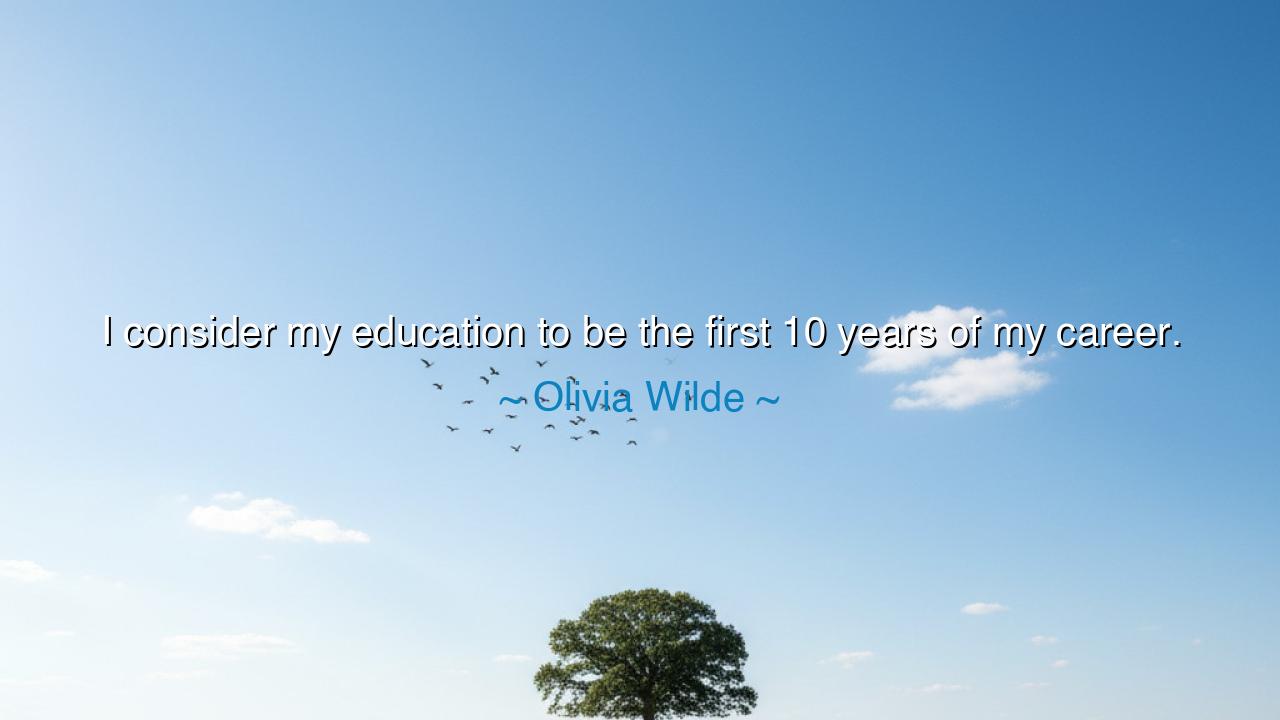
I consider my education to be the first 10 years of my career.






Hear the words of Olivia Wilde, who reflected upon the journey of her life with wisdom: “I consider my education to be the first 10 years of my career.” In this confession lies a truth often forgotten by the proud: that learning does not end when schooling is finished, but continues in the crucible of labor, of mistakes, of victories, and of struggle. For the world itself is a vast classroom, and our careers, our journeys, our daily labors are the teachers who refine us.
What Wilde reveals is the hidden face of education: it is not bound only to books, nor confined to institutions. It is lived. It is won through effort, discipline, and the humility to stumble and rise again. Just as the child learns to walk by falling many times, so too the adult learns mastery by enduring the first difficult years of their craft. To call those years “education” is to honor the truth that true learning is inseparable from living.
The ancients knew this lesson well. Socrates declared that the unexamined life was unworthy of man, for he understood that wisdom comes not merely from study, but from the practice of questioning, of testing oneself in the marketplace, the council hall, and the fields of daily toil. Likewise, Marcus Aurelius, emperor and philosopher, wrote that each hardship of his reign was his greatest teacher. They, like Wilde, knew that the forge of real life gives lessons deeper than parchment or lecture hall.
History too offers us the example of Thomas Edison, whose education was largely self-made. His first years as an inventor were filled with failure: countless experiments, devices that faltered, ideas that collapsed. Yet those years were his truest education, for from them he learned persistence, patience, and refinement. When at last he gave the world the phonograph and the electric light, it was not the result of schooling alone, but of an education written in sweat, trial, and time—just as Wilde describes of her own journey.
The meaning of Wilde’s words is also a warning to the impatient. Many dream of greatness quickly won, of success that comes in an instant. But she reminds us that the first years—the long, uncertain beginning of any path—are not wasted years, but educational years. They shape character, sharpen skill, and prepare the soul for the greater victories that lie ahead. To despise those years is to despise the very foundation upon which future greatness rests.
Thus, the lesson is clear: do not believe that education ends when formal schooling closes its doors. See every moment of your early struggles as part of your training. Do not be ashamed of mistakes; embrace them as lessons. Do not flee from hard beginnings; know that they are preparing you for mastery. The first years of your work—whether in art, in craft, in leadership, or in service—are your apprenticeship to life itself.
Practical actions follow this wisdom. Approach your daily labor as a student, even when you are called a professional. Reflect upon what each challenge teaches you. Keep a record of your failures, not to lament them, but to study them. Honor your mentors, but let experience itself become your greatest guide. And remember: the path of mastery is long, but every step is a lesson that shapes you into who you are meant to be.
Therefore, let Olivia Wilde’s words echo in your heart: your education is not behind you, but within you, unfolding even now. The years of toil, the seasons of trial, the struggles of the beginning—these are not obstacles, but sacred teachers. Embrace them, and you will find that your true education is not a phase of life, but the very journey of life itself.






AAdministratorAdministrator
Welcome, honored guests. Please leave a comment, we will respond soon